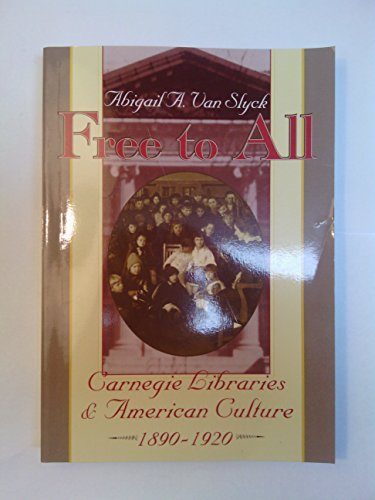Free to All
Carnegie Libraries & American Culture, 1890-1920
Abigail A. Van Slyck
BOOK REVIEW

Free to All: Carnegie Libraries & American Culture, 1890-1920 is an electrifying exploration into the heart of America's literary revolution, a time when the very foundation of culture was being reshaped by a simple idea: access to knowledge should be universal. Abigail A. Van Slyck's masterwork unearths the profound influence of Andrew Carnegie's libraries, serving not just as buildings of brick and mortar, but as beacons of hope and empowerment for millions of Americans from all walks of life.
Picture the scene: it's the late 19th century, and America is buzzing with a newfound sense of possibility. Amidst the burgeoning industrial age, the common man finds his voice not just in the factories, but in the stacks of libraries popping up across the nation. Van Slyck invites you into this world, meticulously detailing how Carnegie's vision transformed the landscape of public education and cultural access. With over two thousand libraries built, this initiative became a symbol of the democratization of knowledge, ensuring that you could be a self-made scholar, regardless of your economic status.
But what does this really mean for us today? The essence of Van Slyck's thesis goes beyond nostalgia; it echoes with relevance in our current age of information disparity. As libraries served to uplift communities, so too should we recognize the value of equitable access in today's digital world. The "Free to All" movement didn't just create libraries; it sparked a cultural awakening, fostering a sense of community, eradicating social barriers, and granting the public a stake in the intellectual dialogue of society.
Let's turn our gaze to the critiques. Many readers might find themselves grappling with the underlying truths of this narrative. Some argue the libraries were not always inclusive-an irony given they were built on the premise of universality. The book reveals the tension between Carnegie's philanthropic spirit and the realities of segregation and class disparity that still lingered. Comments from readers reflect this complexity, voicing feelings of admiration for the libraries' contributions while simultaneously criticizing the exclusionary practices that often marred their legacy. It's a dance-a clash of ideals, revealing the shadows that loom over even the loftiest of visions.
Van Slyck's writing is nothing short of arresting as she weaves together anecdotes, statistics, and striking visuals from the era. You can almost feel the weight of the books, smell the musty pages, and hear the whispers of patrons absorbing knowledge. Her narrative doesn't become a dry academic treatise; it pulsates with life, driven by the voices of those who walked through the doors of Carnegie libraries seeking connection. Her use of historical context becomes a vivid backdrop, illustrating how the public library system was a catalyst for change during the Progressive Era.
As you dive deeper into Free to All, prepare to be moved by the lives transformed within those library walls-from children discovering worlds beyond their neighborhoods to immigrants learning new languages and adapting to new lives. The book educates you not just about the libraries, but about the spirit of inquiry and the tenacity of community. It urges you to reflect on how knowledge empowers and transforms societies, a notion as crucial today as it was over a century ago.
Carnegie pledged his fortune to the betterment of humanity, and Van Slyck's exploration dares you to confront the question: what are we doing with the legacies left behind? As she explores the triumphs and tribulations of this endeavor, a wave of urgency washes over you. The libraries remind us that access to information is not just about books but about the footprints of democracy. In a world where knowledge can uplift or opress, Free to All compels you not to ignore the power of libraries as community havens-they are battlegrounds for equality, fighting against the tides of ignorance.
This book promises transformation. It's not merely a recounting of history; it's a call to action. If you find yourself yearning for a narrative that merges the grandeur of American ambition with the raw realities of human experience, look no further. Free to All stands before you, demanding your attention and beckoning you to look around at the libraries you've ignored, to engage with the reservoirs of knowledge that still await within their walls. Don't let the echoes of the past fade, for they hold the keys to our collective future. 🌟
📖 Free to All: Carnegie Libraries & American Culture, 1890-1920
✍ by Abigail A. Van Slyck
🧾 294 pages
1998
#free #all #carnegie #libraries #american #culture #1890 #1920 #abigail #slyck #AbigailAVanSlyck